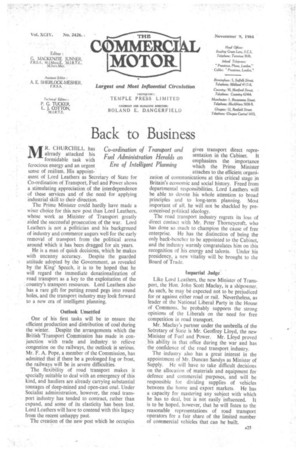Back to Business
Page 27

If you've noticed an error in this article please click here to report it so we can fix it.
MR. CHURCHILL has already attacked his formidable task with ferocious energy and an urgent sense of realism. His appointmen t of Lord Leathers as Secretary of State for Co-ordination of Transport, Fuel and Power shows a stimulating appreciation of the interdependence of these services and of the need for applying industrial skill to their direction.
The Prime Minister could hardly have made a wiser choice for this new post than Lord Leathers, whose work as Minister of Transport greatly aided the successful prosecution of the war. Lord Leathers is not a politician and his background of industry and commerce augurs well for the early removal of transport from the political arena around which it has been dragged for six years.
He is a man of quick decisions, which he makes with uncanny accuracy. Despite the guarded attitude adopted by the Government, as revealed by the King' Speech, it is to• be hoped that he will regard the immediate denationalization of. road transport as a key to the exploitation of the [. country's transport resources. Lord Leathers also has a rare gift for putting round pegs into round holes, and the transport industry may look forward to a new era of intelligent planning.
Outlook Unsettled One of his first tasks will be to ensure the efficient production and distribution of coal during the winter. Despite the arrangements which the British 'Transport Commission has made in conjunction with trade and industry to relieve congestion on the railways, the outlook is serious. Mr. F. A. Pope, a member of the Commission, has admitted that if there be a prolonged fog or frost, the railways will be in severe difficulties. • The flexibility of road transport makes it specially suitable to deal with an emergency of this kind, and hauliers are already carrying substantial tonnages of deep-mined and open-cast coal. Under Socialist administration, however, the road transport industry has tended to contract, rather than expand, and some of its elasticity has been lost. Lord Leathers will have to contend with this legacy from the recent unhappy past.
The creation of the new post which he occupies gives transport direct repre sentation in' the Cabinet. it emphasizes the importance which the Prime Minister attaches to the effkient organization of communications at this critical stage in Britain's economic and social history. Freed from departmental responsibilities, Lord Leathers will be able to devote his whole attention to broad principles and to long-term planning. Most important of all, he will not be shackled by preconceived political ideology.
The road transport industry regrets its loss of direct contact with Mr. Peter Thorneycroft, who has done so much to champion the cause of free enterprise. He has the distinction of being the only back-bencher to be appointed to the Cabinet, and the industry warmly congratulates him on this recognition of his energy and talents. Under his presidency, a new vitality will be brought to the Board of Trade.
Impartial Judge Like Lord Leathers, the new Minister of Transport, the Hon. John Scott Maclay, is a shipowner. As such, he may be expected not to be prejudiced for or against either road or rail. Nevertheless, as leader of the National Liberal Party in the House of Commons, he probably supports the strong opinions of the Liberals on the need for free competition in road transport.
Mr. Maclay's partner under the umbrella of the Setretary of State is Mr. Geoffrey Lloyd, the new Minister of Fuel and Power. Mr. Lloyd proved his ability in that office during the war and has the confidence of the road transport industry. The industry also has a great interest in the appointment of Mr. Duncan Sandys as Minister of Supply. 1-le will have to take difficult decisions on the allocation of materials and equipment for defence and commercial purposes, and will be responsible for dividing supplies of vehicles between the home and export markets. He has a capacity for mastering any subject withwhich he has to deal, but is not easily influenced. It is to be hoped, however, that he will listen to the reasonable representations of road transport operators for a fair share of the limited number of commercial vehicles that can be built.




















































































